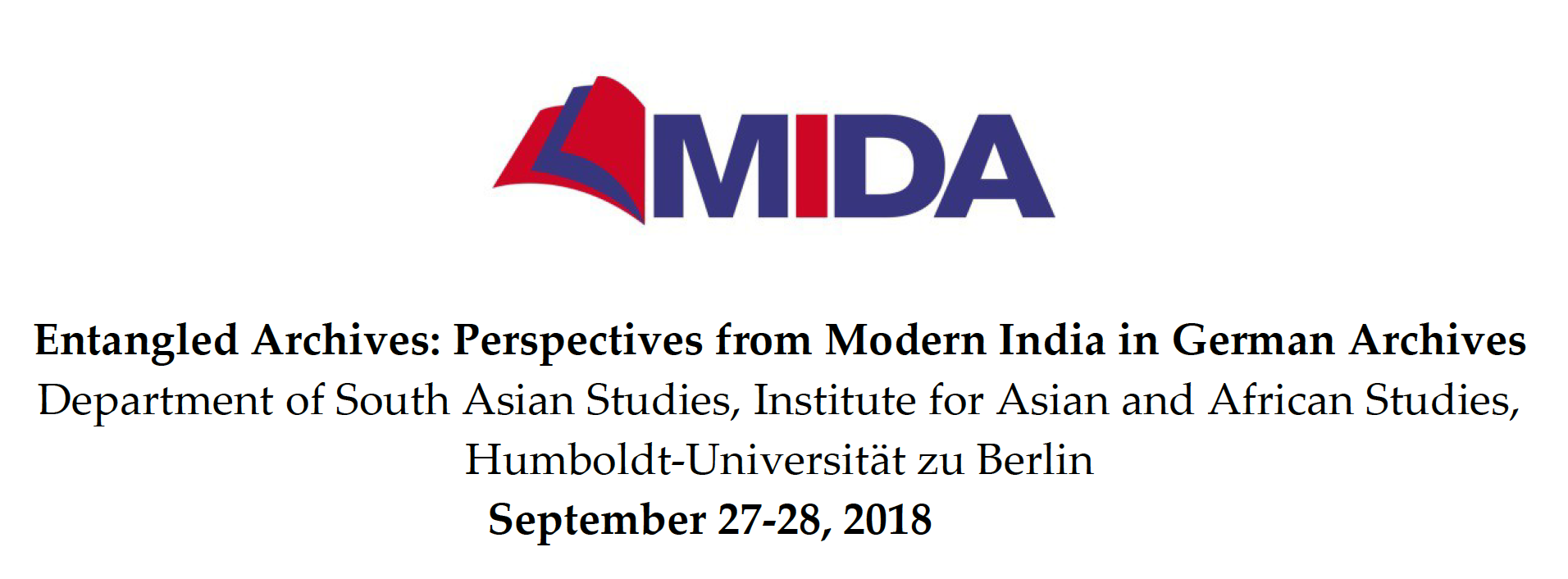Lecture at entangled archives conference in Berlin
Rachel Lee gave a talk on “Cosmopolitan Circulations in Bombay: Otto Koenigsberger, MARG and TIFR”

Entangled Archives: Perspectives from Modern India in German Archives
Department of South Asian Studies, Institute for Asian and African Studies,
Humboldt-Universität zu Berlin
September 27-28, 2018
The turn towards entangled transnational and global histories not only raises new theoretical questions but also confronts us with methodological issues on the relationship between entangled histories and archives. Discussions on archives and their intertwined architectures need to be incorporated in our engagements with entangled histories. Doing this could be a fruitful means to explore how “entangled archives” reflect, and often are a trace of, pasts, which are more interwoven than territorially, containing state archives would lead us to believe. One of the main objectives of this conference is to explore the relationship(s) between entangled histories and their corresponding “entangled archives”, hitherto an unexplored subject of study.
In doing so, amongst other things, we aim to reflect on how the study of the history, organising structures and the underlying logic(s) of archives and their interconnections can inform the writing of entangled histories. It can also help unravel the threads of histories that remain unarchived or are obscured through the politics of institutionalized state archives. This calls for new conceptual and methodological ways to develop and (re-)catalogue entangled archives. Here, the contributions made possible by Digital Humanities can offer new and novel ways of meta-archiving in order to recover entanglements so far dissipated or rendered inaccessible by the territorializing logic of numerous existing archives. However, such ventures can also run the risk of writing over older architectures with new ordering principles that could be equally myopic and limiting.
The conference seeks to initiate conversations among scholars on these diverse but connected issues by focusing on entangled Indo-German histories and archives. We hope to tease out diverse threads in the entangled Indo–German history from the eighteenth to the twentieth century, bringing into light shifting temporalities and histories of empire, nation and post-colonialism. The conference urges a reconsideration of Indo–German history as not merely situated in isolated actors, locales and institutions, but entrenched within and emerging from a larger history and politics of concepts, ideas and intellectual exchanges. It aims to examine the entangled archives produced by not just state institutions but also diverse groups and actors to explore entanglements, which are so far concealed by archival structures that de-emphasize interconnected, overlapping and crisscrossing pasts by pursuing a logic of national separateness. The richness and diversity of Indo-German intellectual correspondences enable a finer appreciation of entangled Indo-German history and archives. Further, the dialogic and transnational nature of the archive and the comparative approach of the conference recognize the value of German and Indian languages in writing a truly enmeshed Indo–German history. The conference presents archival and research findings from the first phase of Modern India in German Archives (MIDA) project as well as brings together other scholars in the field of Indo-German entangled histories.
Day 1 Thursday, 27. 9. 2018
9:00- 9:15
Welcome and Introduction
Ravi Ahuja (Göttingen University)
9:15- 11:00
Panel 1: Entangled Knowledge: Institutions, Actors and Outcomes I
Chair: Angelika Malinar (Zurich University)
Martin Christof-Füchsle (Göttingen University)
Missionary and Military Sources on the Mysore wars from German Archives
Pascale Rabault-Feuerhahn (CNRS, Paris)
Professional Indology. Late 19th century German debates about the possibility and legitimacy
of Indian Indological scholarship.
11:00-11:15 Tea Break
11:15-13.00
Panel 2: Entangled Knowledge: Institutions, Actors and Outcomes II
Chair: Joachim Oesterheld (ZMO)
Razak Khan (Göttingen University)
Rethinking Translation as Entangled Archive of Ideas in Global Intellectual History
Thiago Pinto Barbosa (ZMO)
Following science making in entangled archives: considerations from an actor-network
approach to understanding global entanglements in anthropological knowledge production
13:00- 14:00 Lunch Break
14:00-15:45
Panel 3: Senses of Archives
Chair: Michael Mann (Humboldt University)
Gerdien Jonker (Erlangen University)
Private and Family Archives and Writing of Entangled Indo-German Histories
Britta Lange (HU)
Berlin Sound Archives – Epistemologies, Practices and Imaginations
15:45-16:00 Tea Break
16:00-17:45
Panel 4: Germans in India: Entangled Histories and Archives
Chair: Ravi Ahuja (Göttingen University)
Panikos Panayi (De Montfort University)
The Entangled British German and Indian Archives: The Case of German Internees in India
during the First Word War
Roland Wittje (IIT,Madras)
Indo-German Collaboration in Science and Technology: The Indian Institute of Technology
Madras
19.00 Conference Dinner
Day 2 Friday, 28. 9. 2018
10:15-12:00
Panel 5: Friendship, Enmity and Making of Political Archives
Chair: Vandana Joshi (Delhi University)
Anandita Bajpai (Humboldt University)
The Sound of Friendship: Warm Wavelengths of Radio Berlin International during
the Cold War years in India
Alexander Benatar (Humboldt University)
Cold War Rivalry and Making of Foreign Ministry Archives
12:00-13:30 Lunch Break
13:30- 15:15
Panel 6: Trust and Cooperation
Chair: Heike Liebau (ZMO)
Rachel Lee (Ludwig-Maximilians-Universität München)
Cosmopolitan Circulations in Bombay: Otto Koenigsberger, MARG and TIFR
Svenja von Jan (Göttingen University)
German-Indian entanglements of lascar seamen in Hamburg
15:15- 15:30 Tea Break
15:30–17:30
Roundtable Discussion on Entangled Archives and Histories
Moderator: Rekha Kamath Rajan (Jawaharlal Nehru University)
Participants:
Margit Franz (Graz University)
Chen Tsoref Ashkenazi (Heidelberg University)
Indra Sengupta (GHI, London)
Jahnavi Phalkey (Science Gallery, Bengaluru)
Henning Trüper Helsinki University)

